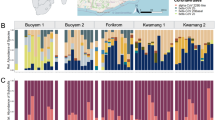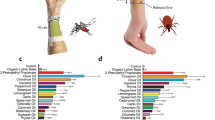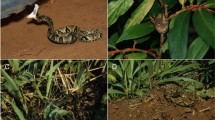Abstract
SEVERAL hymenopterous parasites have been released in Australia and New Zealand as possible biological control agents for the woodwasp Sirex noctilio F. These include Ibalia leucospoides (Hochenw.), Rhyssa persuasoria (L.) and Megarhyssa nortoni nortoni (Cresson). I. leucospoides attacks the siricid egg or newly hatched larva, whereas the other two species attack late stage larvae, pupae and (rarely) emerging adults.
This is a preview of subscription content, access via your institution
Access options
Subscribe to this journal
Receive 51 print issues and online access
$199.00 per year
only $3.90 per issue
Buy this article
- Purchase on Springer Link
- Instant access to full article PDF
Prices may be subject to local taxes which are calculated during checkout
Similar content being viewed by others
References
Talbot, P. H. B., Austral. J. Bot., 12 (1), 46 (1964).
Coutts, M. P., and Dolezal, J. E., Austral. Forest Res., 1 (4), 3 (1965).
Author information
Authors and Affiliations
Rights and permissions
About this article
Cite this article
MADDEN, J. Behavioural Responses of Parasites to the Symbiotic Fungus associated with Sirex noctilio F.. Nature 218, 189–190 (1968). https://doi.org/10.1038/218189a0
Received:
Issue Date:
DOI: https://doi.org/10.1038/218189a0
This article is cited by
-
Trees and Insects Have Microbiomes: Consequences for Forest Health and Management
Current Forestry Reports (2021)
-
A Tale of Convergence
Journal of Chemical Ecology (2014)
-
Linking reproductive and feeding strategies in the parasitoid Ibalia leucospoides: does feeding always imply profit?
Evolutionary Ecology (2013)
-
Microbial Volatile Emissions as Insect Semiochemicals
Journal of Chemical Ecology (2013)
-
Food and Host Searching Decisions Made by Ibalia leucospoides (Hymenoptera: Ibaliidae), a Parasitoid of Sirex noctilio (Hymenoptera:Siricidae)
Journal of Insect Behavior (2012)
Comments
By submitting a comment you agree to abide by our Terms and Community Guidelines. If you find something abusive or that does not comply with our terms or guidelines please flag it as inappropriate.



